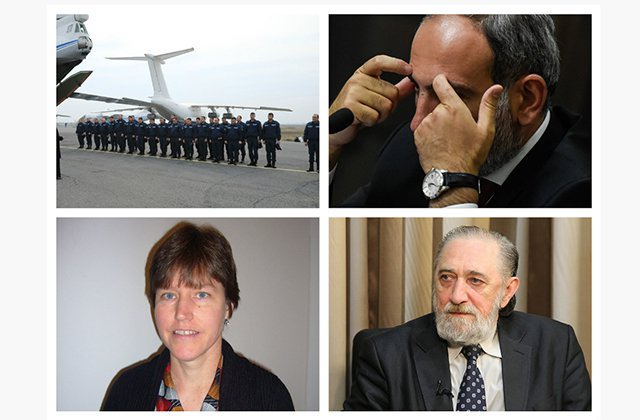“The entry of Armenian specialists into Syria contains numerous risks”

Yesterday marked the launch of the humanitarian mission that was initiated by the new government of the Republic of Armenia and was discussed and criticized for months. According to the press release issued by the Ministry of Defense, a group of 83 Armenian specialists comprising humanitarian deminers, doctors and security personnel has arrived in the Syrian city of Aleppo to provide humanitarian aid to the Syrian people.
According to the Ministry of Defense, the Armenian specialists will provide humanitarian demining, mine awareness and medical assistance only in those districts of Aleppo where no military operations are carried out. “The Republic of Armenia has decided to provide humanitarian assistance to the Syrian people due to the harsh humanitarian conditions in Syria, especially in Aleppo, following the heavy military operations, and based on UN Security Council’s Resolution 2393 of 2017 and Resolution 2401 of 2018, as well as based on written requests from Syria and due to a large Armenian community in Aleppo. Issues related to accommodation of the Armenian specialists in Syria, as well as those related to their status, tasks and security have been agreed upon in accordance with the legislation of the Republic of Armenia. Transportation of the Armenian specialists to Syria, as well as their security issues are being carried out with Russia’s assistance,” the press release reads.
Let us remind that on August 17, 2018, Prime Minister of the Republic of Armenia Nikol Pashinyan held a rally to recap the 100 days of his term of office, and during that rally, RA Prime Minister Nikol Pashinyan announced about an unprecedented Armenian-Russian humanitarian project that, according to him, would move Armenian-Russian relations to another level.
Later, it became clear that this project was this initiative which, according to the RA Prime Minister, does not contain any military component. Moreover, according to the authorities, the Syrian government officially requested Armenia to provide assistance to Syria.
Based on the claims of the Armenian government, the group in Syria cannot be viewed as a troop. RA Deputy Minister of Defense Gabriel Balayan stated that this group is not a troop or unit of the Armed Forces, but a group of exclusively humanitarian specialists. According to him, the group will be subject to the Republic of Armenia and might collaborate with Russia in some regards.
In the meantime, Vice-President of the Republican Party of Armenia (RPA), former Chairman of the Standing Committee on Foreign Relations of the National Assembly Armen Ashotyan claims that the group sent to Syria is a troop and that Pashinyan has crudely violated the law due to his political interests. Ashotyan particularly wrote the following: “The Government of the Republic of Armenia must quickly answer the following questions:
- The Government must publish the official request of the Syrian government to send an Armenian troop.
- Why has the Government violated the law and sent a troop to Syria without a relevant international treaty?
- How are the rights of our servicemen guaranteed in Syria?
I wish our servicemen a good service. I am certain that they will perform their duties with honor, regardless of the existing problems. Peace to Syria.”
As a matter of fact, these days, RA Minister of Defense Davit Tonoyan is on a working visit to the Russian Federation, and on 8 February, Davit Tonoyan had a meeting with Minister of Defense of the Russian Federation Sergey Shoygu. Shoygu expressed gratitude to Armenia for the humanitarian assistance that the country is providing to Syria and viewed it as an essential contribution. In his turn, Tonoyan also expressed his gratitude to Russia for its support and for the cooperation in Syria.
In an interview with 168.am, German political analyst Susan Stewart said that the entry of Armenian specialists into Syria contains numerous geopolitical, military, interior political and security risks. “It is clear why this project was initiated and why the Ministries of Defense of Russia and Armenia are actively collaborating with several objectives to implement in various sectors.
However, they are collaborating in a sector in which Armenia’s contribution may, to a certain extent, compensate for the influence that the problems having emerged in other sectors has on Armenian-Russian relations.
We see that this is the thread in Armenian-Russian relations that has been maintained in those relations, yet there are problems in other sectors. As a matter of fact, my impression is that this is exactly how Russia views the effectiveness of Armenian-Russian relations and the collaboration in this sector. We see that the Ministers are cooperating effectively and expressing gratitude to each other, yet other circles in Russia aren’t very excited about this project in particular.
So, in my opinion, the idea and goal that perhaps lied at the core of this project (to contribute to Armenian-Russian relations) are, in some sense, being implemented in a particular sector. However, besides Armenian-Russian relations, this is a matter of security, that is, the safety of those specialists. I am certain that the Armenian government has observed the issue, but we understand that the guarantees observed in such cases — in the case of a complicated conflict such as the Syrian conflict — are not reliable.
There is a security issue due to the fact that there are both direct and indirect risks (any group, party or intermediary attracts attention and runs the risk of becoming a target). In this case, we are also dealing with this risk, especially if we take into consideration the difference in terms of religion,” the analyst said, adding that it is important to reiterate the fact that this is a humanitarian initiative and that it is not aimed at meeting military objectives.
However, according to Stewart, this is not enough to neutralize the risks. According to the German political analyst, the West will also have a certain negative attitude towards this initiative, but will be restricted to talk about the initiative by taking into consideration the humanitarian considerations that are being declared. “Nevertheless, this is also a factor that needs to be taken into consideration, and it is necessary to try to make sure the West doesn’t view this as a big issue,” Stewart said.
In his turn, Russian Oriental studies expert Viktor Nadein-Raevsky also said that any similar initiative in Syria and similar zones poses numerous challenges.
“We have talked about this in detail. Those challenges still exist since the war in Syria is a war of terrorists, there are different forces and different interests, and so it is necessary to be careful,” the analyst said, stressing the fact that the problems are related to not only security, but also politics because even though Armenia is neutral and is not a part of any coalition, this may be viewed as a part of the coalition of Russia.
As far as Armenian-Russian relations are concerned, the Russian analyst believes this project will have a positive impact to a certain extent. “However, the level of mutual confidence in relations is measured by observing the whole spectrum of the relations. Currently, it seems as though the situation is uncertain,” Nadein-Raevsky said.
Araks Martirosyan

























